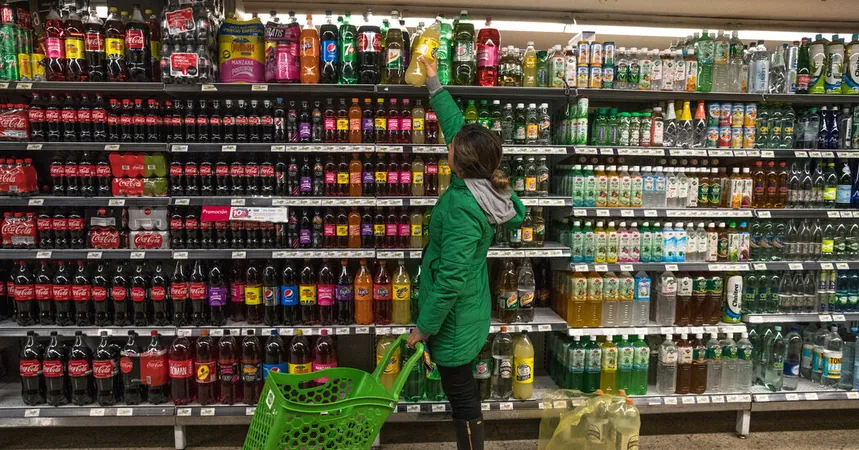
The Hidden Dangers of Sugary Drinks: A Global Health Crisis Unfolds
2025-01-07
Author: Wei
The Global Health Impact of Sugary Drinks
Research reveals a shocking statistic: consumption of sugar-sweetened beverages is linked to approximately 340,000 deaths annually from Type 2 diabetes and heart disease worldwide. This eye-opening conclusion stems from a recent study published in Nature, marking one of the most extensive investigations into how Western dietary habits resonate on a global scale.
Rising Cases and Deaths
In 2020 alone, sugary drinks were associated with 2.2 million new cases of Type 2 diabetes and 1.2 million instances of cardiovascular disease. Alarmingly, a significant portion of these health issues were documented in sub-Saharan Africa and Latin America—regions experiencing a surge in soft drink consumption as beverage companies pivot toward burgeoning markets after facing stagnation in North America and Europe.
Health Ramifications
The increase in health-related fatalities due to these drinks is staggering. Previous studies, such as one from 2015, estimated around 184,000 deaths worldwide linked to sugary beverage consumption—demonstrating a troubling upward trend in the detrimental impacts of these beverages.
The health ramifications of sugary drinks—ranging from carbonated sodas to energy drinks—are well established. These beverages deliver large quantities of empty calories that can supplant healthier food choices. Their overconsumption is closely tied to rising obesity rates, impaired liver function, and greater susceptibility to chronic diseases like hypertension and Type 2 diabetes—conditions that can lead to blindness, amputations, and early death.
Calls for Urgent Action
Dariush Mozaffarian, a leading researcher on the study and director of the Food is Medicine Institute at Tufts University, emphasized the need for urgent action: “While society responds acutely to visible tragic deaths, like those from airline accidents or terrorist attacks, the silent toll of sugary drink-related deaths deserves equal attention.” He advocates for stronger regulatory measures, particularly in developing countries where healthcare infrastructures struggle to cope with the avalanche of diet-related health crises.
Global Dietary Database
This analysis arises from the Global Dietary Database, an ambitious project funded by the Bill and Melinda Gates Foundation aimed at collecting comprehensive information about dietary habits globally, especially in under-resourced countries. The database, which began in 2008, allows researchers to track dietary trends and the pervasive influence of highly processed foods that derail traditional, healthier eating practices.
Obesity Rates and Limitations of the Study
To put this issue in context, over one billion people worldwide are now classified as obese, with rates soaring over twofold since 1990 among adults and quadrupling in children. Moreover, the study does come with its limitations, incorporating observational data from 1990 to 2020 and drawing from over 450 studies.
Response from the Beverage Industry
The beverage industry has not gone unnoticed; executives are questioning the study's conclusions, citing possible incompleteness in the data from certain countries. Katherine Loatman, director of the International Council of Beverages Associations, urged caution in interpreting these findings, stating, “Policies should be built on solid scientific evidence.”
Consumption Patterns
Dr. Barry M. Popkin, a recognized nutritionist who wasn’t involved in the study, confirmed that the findings reflect chronic issues linked to processed foods globally and highlight critical health and productivity challenges, particularly in regions like Africa and Latin America.
The research also unearthed interesting consumption patterns. For instance, men displayed slightly higher rates of soda consumption than women, and education influenced habits—higher intake was noted among educated adults in sub-Saharan Africa and Latin America, while less educated individuals in the Middle East and North Africa were found to consume more sodas.
Positive Trends in Latin America
Despite the daunting statistics, there is a glimmer of hope. Countries in Latin America and the Caribbean are witnessing a decline in soda consumption thanks to initiatives like soda taxes and better public education regarding the health risks of sugary drinks. Over 80 countries have implemented measures to combat excessive sugar intake.
In Brazil, progress is notable as advocacy groups report diminishing enthusiasm for sugary drinks influenced by substantial reforms—including improved school meal programs and front-of-package warnings. Paula Johns, director of ACT Health Promotion in Brazil, asserts, “There’s no magic bullet, but a comprehensive approach helps convey the dangers of sugary drinks to the public.”
Conclusion
In summary, as the global health crisis fueled by sugary drink consumption escalates, informed policy-making and community awareness must converge to counteract a trend with severe health implications for millions.


 Brasil (PT)
Brasil (PT)
 Canada (EN)
Canada (EN)
 Chile (ES)
Chile (ES)
 Česko (CS)
Česko (CS)
 대한민국 (KO)
대한민국 (KO)
 España (ES)
España (ES)
 France (FR)
France (FR)
 Hong Kong (EN)
Hong Kong (EN)
 Italia (IT)
Italia (IT)
 日本 (JA)
日本 (JA)
 Magyarország (HU)
Magyarország (HU)
 Norge (NO)
Norge (NO)
 Polska (PL)
Polska (PL)
 Schweiz (DE)
Schweiz (DE)
 Singapore (EN)
Singapore (EN)
 Sverige (SV)
Sverige (SV)
 Suomi (FI)
Suomi (FI)
 Türkiye (TR)
Türkiye (TR)
 الإمارات العربية المتحدة (AR)
الإمارات العربية المتحدة (AR)